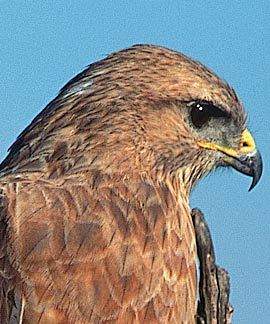
The Birds of Prey

Raptors Life Span

Large eagles can live for up to 45 years, while smaller raptors like kites and buzzards have a lifespan of around 15 years.
Raptors are the lords of the skies and Kruger is their sanctuary. There are 83 species of raptor that regularly occur in southern Africa. Of these, some 58 species are commonly found in Kruger.
The Park's largest resident raptor is the Lappet-faced Vulture, which weighs up to 7.9kg and has a 2.8-m wingspan. The smallest raptor in Kruger is probably the Pearl-spotted Owlet weighing in at about 65g, with a wingspan of around 35cm.
Raptors are dramatic hunters. Their name is derived from the Latin word raptare, which means to seize. Broadly classified under the family Falconidae, raptors hunt during the day, have powerful, hooked beaks, strong, curved talons and in the words of Leonard Gill, 'imperious expressions'.
The group includes eagles, hawks, buzzards, harriers, kites, falcons, vultures and the Secretarybird. The Strigiformes - the night hunters, which include 12 species of owl - are also classified as raptors.
The Big Three eagles of Kruger are Verreauxs' Eagle, the Martial Eagle and the African Crowned Eagle. There has been some debate as to whether aggressive birds such as shrikes and drongos that hunt live prey should also be classified as raptors, but as they lack the defining hooked beaks and talons of the Falconiformes, they have not been included.
In many instances, raptors find partners for life and exhibit elaborate aerial courtship displays. Often the female is larger than the male. Many of the bigger raptors practice 'cainism' (derived from the biblical story of Cain and Abel) in which the first-born chick kills its sibling to secure its own survival. The parents allow nature to take its grisly course.
Raptor Groups
This section on raptors has been structured according to the comprehensive Raptor Identification Guide for Southern Africa by Ulrich Oberpreiller and Burger Cillie.
They divide birds of prey into the following 11 broad groups, based on morphology rather than names:
Group | Characteristics | Species associated with Kruger | ||
Secretarybird | Large bird with long crest of feathers; usually seen walking in open veld - the only species in this group | Secretary Bird | ||
Fish-eating raptors | Large raptors associated with water; swoop down to catch fish just below water surface | African Fish-Eagle, Osprey | ||
Vultures | Robustly built birds that are primarily scavengers | Lappet-faced Vulture, White-headed Vulture, White-backed Vulture, Cape Vulture, Hooded Vulture | ||
Eagles and Hawk-Eagles | Large, powerful and aggressive hunters that have fully feathered legs and hunt medium-sized and small animals | Martial Eagle, Verreauxs' Eagle, African Crowned Eagle, Lesser Spotted Eagle, Wahlberg's Eagle, Long-crested Eagle, African Hawk-Eagle, Steppe Eagle, Tawny Eagle, Booted Eagle, Ayres's Hawk-Eagle | ||
Snake-Eagles | Medium to large raptors; predominantly snake-eaters that have unfeathered lower legs | Bateleur, Black-chested Snake-Eagle, Brown Snake-Eagle | ||
Buzzards | Mostly medium-sized raptors with unfeathered lower legs; usually hunt from perches | Steppe Buzzard, Jackal Buzzard | ||
Goshawks and Sparrowhawks | Small to medium-sized raptors; usually found in denser woodland; shorter wings give greater manoeuvrability through tree canopy; often catch other birds in flight | African Harrier-Hawk, Lizard Buzzard, Dark Chanting Goshawk, Gabar Goshawk, Shikra*, African Goshawk, Little Sparrowhawk, Black Sparrowhawk | ||
Harriers | Medium-sized raptors; more slenderly built than hawks; usually associated with marshland and open grassland | African Marsh-Harrier, Pallid Harrier, Montagu's Harrier | ||
Kites | Small to medium-sized raptors; diverse in shape and size but all have long wings and are good fliers | Yellow-billed Kite, Black Kite, Black-shouldered Kite, African Cuckoo Hawk, Bat Hawk | ||
Falcons and Kestrels | Smallish raptors; fast fliers that swoop on prey; kestrels hover before swooping | Peregrine Falcon, Lanner Falcon, Eurasian Hobby, Red-footed Falcon, Amur Falcon, Rock Kestrel, Lesser Kestrel, Dickinson's Kestrel | ||
Owls | Small to large raptors, generally nocturnal | Barn Owl, African Wood-Owl, Southern White-faced Scops-Owl, African Scops-Owl, Pearl-spotted Owlet, African Barred Owlet, Spotted Eagle-Owl, Verreaux's Eagle-Owl, Pel's Fishing-Owl, Marsh Owl, African Grass-Owl |
